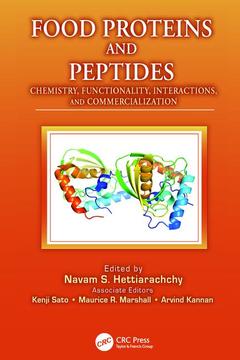Description
Food Proteins and Peptides
Chemistry, Functionality, Interactions, and Commercialization
Language: English
Subject for Food Proteins and Peptides:
Keywords
Soy Proteins; Bioactive Peptides; whey; Emulsifying Properties; amino; Protein Hydrolysates; acid; Casein Micelles; bioactive; Soybean Protein; soy; Whey Protein; hydrolysate; Foaming Capacity; disulfide; 7S Globulin; bond; Food Proteins; soybean; Disulde Bonds; casein; Amino Acids; Emulsifying Agents; Egg White Foams; Hypocholesterolemic Peptide; CYP7A1 Gene Expression; Bioactive Food Proteins; Oil Water Interface; Bovine Αs1 Casein; Protein Foams; Sapphire Surfaces; Foaming Properties; Maillard Reaction; Egg Yolk Proteins; Plateau Borders
Publication date: 10-2016
· 15.6x23.4 cm · Paperback
Publication date: 04-2012
456 p. · 15.6x23.4 cm · Hardback
Description
/li>Contents
/li>Readership
/li>Biography
/li>
A multidisciplinary resource, Food Proteins and Peptides: Chemistry, Functionality, Interactions, and Commercialization enables researchers in biochemistry, biotechnology, food science and technology, nutrition, and medicine to understand the physicochemical and biochemical factors that govern the functionality of these food components. Following chapters on the structure and chemistry of amino acids, peptides, and proteins, the book describes modes of characterization and the functional relationships of food proteins. It examines protein solubility and insolubility and explores proteins and peptides as emulsifying and foaming agents.
Specialized topics include:
- Factors affecting heat-induced casein?whey protein interactions in bovine milk systems
- The effects of protein?saccharide interactions on the properties of food components
- Ameliorative action of peptides on cholesterol and lipid metabolism
- Proteins and peptides with elements of sweetness, kokumi, umami, and bitterness
- A new approach for the large-scale fractionation of peptides based on their amphoteric nature
The book examines the source of bioactive peptides and describes their bioavailability, including their absorption and occurrence in human blood. It also provides a database of biologically active proteins and peptides. Final chapters review current status, future industrial perspectives, and future trends of bioactive food proteins and peptides and explore the role of nanotechnology in protein research.
With contributions from a panel of international scientists, this volume captures the state of the art in protein and peptide research, providing a launching pad for further inquiry and discovery.
Food Proteins–Peptides: Chemistry and Structure. Food Proteins–Peptides: Determination and Characterization. Food Proteins and Peptides: Structure–Function Relationship.Protein Solubility and Functionality. Proteins–Peptides as Emulsifying Agents.Proteins and Peptides as Foaming Agents. Chemical and Enzymatic Protein Modifications and Functionality Enhancement. Heat-induced Casein–Whey Protein Interactions. Protein–Saccharide Interaction. Peptide–Lipid Interactions and Functionalities. Proteins and Peptides with Taste. Bioavailability and Safety of Food Peptides. Database of Biologically Active Proteins and Peptides. Food-Derived Bioactive Peptides in the Market. Large-scale Fractionation of Biopeptides. Industry Perspectives and Commercial Trends for Food Protein and Biopeptides. Protein Nanotechnology: Research, Development, and Precaution in the Food Industry.Index.
Professor Navam Hettiarachchy’s research program focuses on an integrated approach to protein chemistry, bioactives, peptides (anti-cancer, anti-Alzheimer’s, anti-diabetic/obesity & satiety), nutraceuticals, functional foods, and food safety. She also works in adding value to industry co-products using novel technologies to obtain antimicrobials, antioxidants, and functional ingredients, and in new food product development and food safety. She serves as a resource person related to her area of expertise and is the co-founder of Nutraceutical Innovations, LLC. She is internationally renowned for her research program on protein, bioactives, cereals and legumes.
Professor Maurice Marshall’s
hydrolysis of waste seafood protein for bioactive peptide generation and their action as antioxidants and as antidiabetic, anticancer, and high-blood-pressure regulators.
Professor Kenji Sato’s Dr. Arvind Kannan
These books may interest you

Functionality of Proteins in Food 158.24 €



